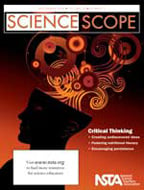Elizabeth has not updated the personal profile information on this page. Please contact Elizabeth and make this suggestion!
Have you updated your profile?
Become part of the NSTA professional learning community, sharing digital resources, ideas, and classroom strategies, and connect and learn about those with whom you are collaborating!
Updating your profile is easy to do and allows others to learn more about you as part of the NSTA community, just click the "My Profile" link located at top of this page and begin entering your information. This professional profile space serves as the destination where you can find your NSTA certificates, NSTA conference transcripts, online activity log, total activity points, and the NSTA badges that you have earned for your online work. We encourage you to add your photo or image and to update your "Notification Preferences" for community forums discussions.
- Public Collections
-
No Public Collections
- Forum Posts
-
No Posts
- Reviews
-
Recent Reviews by Elizabeth
Science 101: Why is Pluto no longer a planet?
Tue, May 05, 2015 6:10 PM
 Good Background
Good Background
This article provides readers with a great background of what went into the declassification of Pluto as a planet. There is information on how classification in science is handled and there is a detailed look into what goes into determining it. Creation and understanding of scientific theories is briefly discussed in this article as well. This article over is a great way for teachers to acquire an overview of Pluto becoming a dwarf planet.

Going Bananas Over Fruit: Using Habits of Mind to Foster Nutritional Literacy
Tue, May 05, 2015 5:48 PM
 Great Activities
Great Activities
Habits of mind skills are ever-so present in science content areas, yet many students do not use metacognition to understand t deeper. This article does a great job at providing readers with a background of each activity, then ways to implement nutritional literacy at the middle school stage using habits of mind skills. The activities provided are ones that teachers can use in their classrooms, but tweak it to fit their students’ needs. I would definitely use the resources provided in the article when planning to use this activity. These activities are rather in depth and easy to implement. Examples are provided, yet they can be changed according to how the teacher believes his/her students learn best. Throughout these activities there are probing questions to cause students to think deeper and use their habits of mind skills. These activities would most likely make their way into my nutritional curriculum during the school year.

Pennies
Tue, May 05, 2015 5:29 PM
 Great Advice
Great Advice
This book introduction chapter addressed the issue of student generalization of a topic. Students do generalize, however, teachers in this instance found students did not generalize about life cycles. The teachers and administrators found that students neglected to apply their knowledge to all plants and animals after conducting an inquiry investigation. The chapter goes on to introduce how teachers can use probes can be used in the classroom to avoid this scenario in future lessons. The chapter suggests nine pointers that will help the implementation of probes in a classroom and for use of formative assessment. I liked this introduction to the book because of how in depth it goes into each suggestion. There are examples for most of the suggestion probes, which are directly applicable to teachers and easy to read and comprehend. This file also provides readers with access to a few probes that can be directly used in their classrooms, and provides readers with pointers for curriculum and instruction. Overall, this book introduction is rather useful to teachers and easy to follow for implementation.
View all reviews by Elizabeth